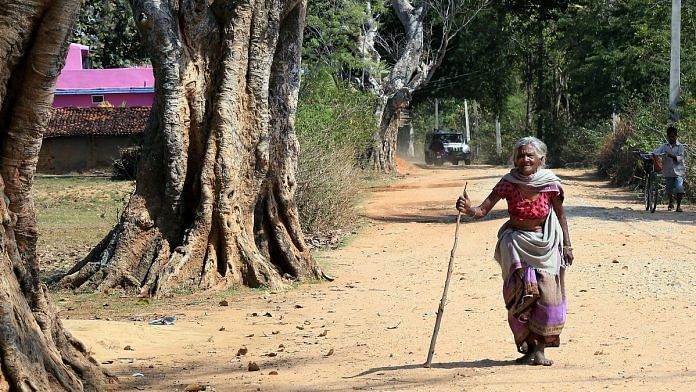New Delhi: Compromise on the quality of construction of roads under the Pradhan Mantri Gram Sadak Yojana (PMGSY) is unacceptable, the Standing Committee on Rural Development and Panchayati Raj has said in its report tabled in the Lok Sabha Thursday.
The report, which assesses the PMGSY — a scheme launched in December 2000 to provide all-weather roads to connect rural areas — urges the Union rural development ministry to take “stronger measures” to ensure that road quality is not compromised
“Instances are galore wherein the attention of the committee has been drawn towards the poor road materials used in the construction of roads at many places which are not able to sustain the rigours of weather and traffic volume even for one season and are washed away with the onset of monsoon,” says the report.
The committee observed that contract work taken up at low rates, and a provision in the PMGSY to allow subletting of work to petty contractors, was affecting the quality of construction of roads. It recommended that the ministry should rigorously monitor as well as review the subletting provisions.
“The petty contractors who come into the picture by way of multiple sublettings are sometimes not able to maintain the quality of construction and the goals of the scheme. Such practices result in poorly constructed roads, [are] devoid of standard protocols and have adverse effects on the project,” the panel said in the report.
Apart from poor quality of construction, the committee expressed concern over the slow pace of work under the PMGSY, the first phase of which was launched in 2000, the second in 2013 and the third in 2019.
Pointing to an “inordinate” delay in the completion of work under PMGSY-I and PMGSY-II, which was targeted to be finished by September 2022, the committee said: “Just 96.24 percent under PMGSY-I and 97.01 percent under PMGSY-II of the targets fixed have been achieved as on January 31, 2023.”
As for PMGSY-III — which was launched to consolidate existing routes and major rural links to connect rural habitations to agricultural markets, higher secondary schools and hospitals — just 97,000-odd kilometres of roads have been sanctioned out of 1.25 lakh kilometres since 2019, according to the report. The deadline for completion of work under phase III is March 2025.
The slow pace of work was also flagged by the Ministry of Statistics and Programme Implementation (MoSPI) in its report published in April.
According to the MoSPI report, seven states and Union territories, including West Bengal and Maharashtra, failed to reach even 20 percent of their targets under the PMGSY for rural connectivity in the first nine months of the last financial year.
MoSPI’s progress report of the Twenty Point Programme-2006 categorised the progress of states and UTs that met less than 80 percent of the targets as “poor”.
Overall, 24 states and UTs came under this category, including several where the BJP is in power or is part of a ruling coalition, namely Gujarat, Assam, Haryana, Madhya Pradesh, Maharashtra and Uttarakhand.
Also Read: Govt launched housing scheme for migrant workers amid Covid exodus. 3 yrs on, only 5,648 flats ready
‘Out-of-the-box’ solutions needed
Just 51.61 percent of the work sanctioned under the Road Connectivity Project for Left Wing Extremism Affected Areas (RCPLWEA) was completed as of 31 January this year, the standing committee noted in its report on the PMGSY.
The RCPLWEA was launched in 2016 to improve road connectivity in the 44 districts worst affected by LWE as well as some adjoining districts in nine states — Andhra Pradesh, Bihar, Chhattisgarh, Jharkhand, Madhya Pradesh, Maharashtra, Odisha, Telangana and Uttar Pradesh. The deadline for completion of the project was March this year.
The rural development ministry informed the committee that the delay in road construction under RCPLWEA was mainly due to “law and order situation, forest clearance issues and many times, non-availability of contractors in the states”.
Recommending that the ministry come up with “out-of-the-box solutions”, the committee observed: “The more delay caused in bringing the affected population to mainstream via the connectivity, the situation would take even longer to be controlled and developed for good. Special efforts and perhaps area-specific professionals who are skilled to work in combat and insurgent zones such as Border Roads Organisation might serve as a boost to the lagging projects under RCPLWEA.”
Convergence of PMGSY and MGNREGS
For better utilisation of government funds, the parliamentary panel has recommended the convergence of PMGSY and another rural development programme, the Mahatma Gandhi National Rural Employment Guarantee Scheme (MGNREGS).
“On the one hand, the unskilled labourers of MGNREGS would get their workdays while the PMGSY construction work would be collaterally taken up, thus saving its fund,” the panel stated in its report.
The rural development ministry informed the panel in November last year that the issue of converging the two schemes was in an advanced stage of discussions. It also stated that tree plantation along the roads constructed under PMGSY was being done in convergence with the MGNREGS.
(Edited by Nida Fatima Siddiqui)
Also Read: Chambal Ravines are now safe because of new roads. But Indians must learn how to drive



